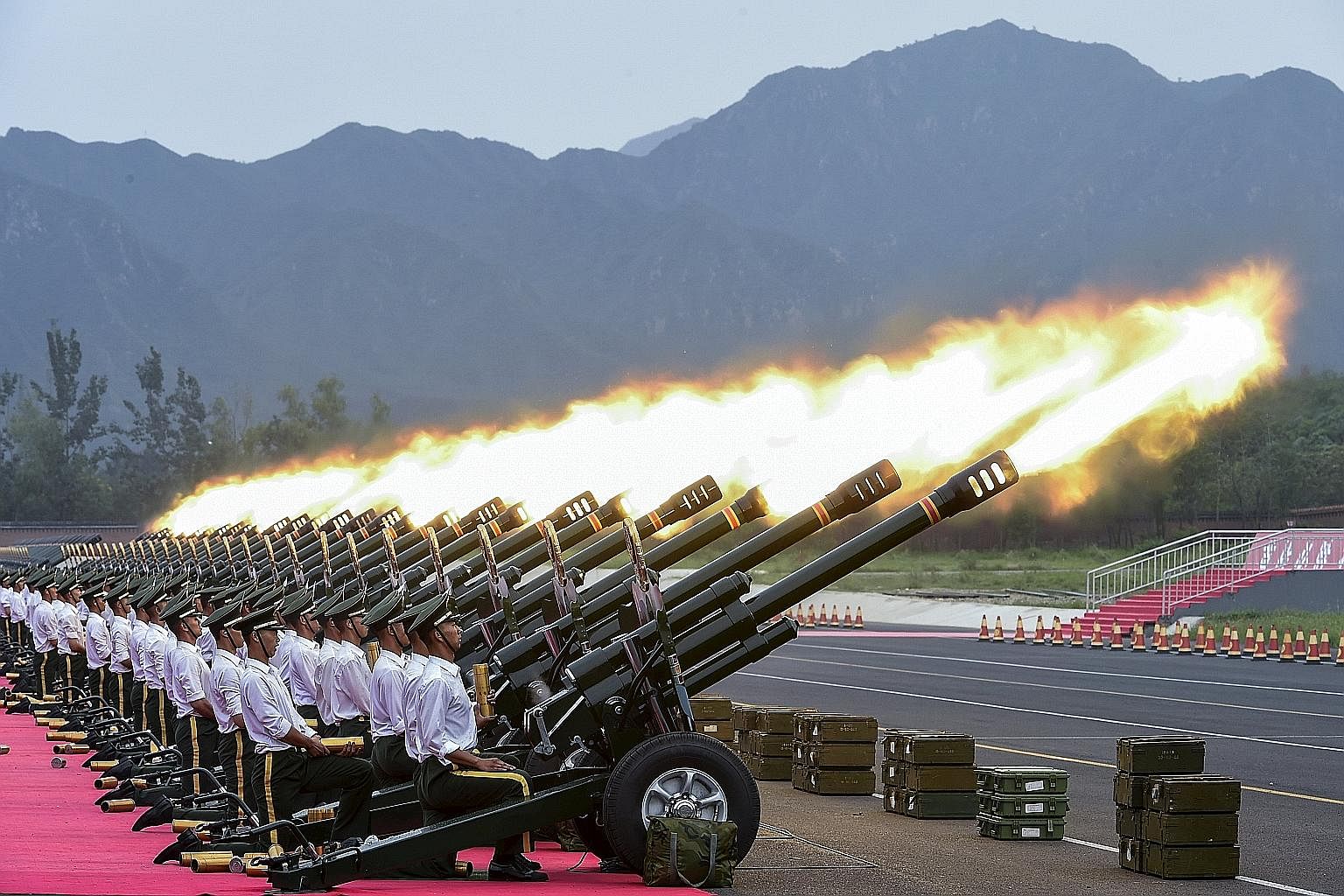BEIJING • Victors write history, or so they say.
But even winners face limitations and encounter frustrations.
In China, where the Chinese Communist Party (CCP) spares no effort to hail its role in resisting Japanese aggression from 1931 to 1945, President Xi Jinping has expressed dissatisfaction with the world's recognition of the country's contributions in ending World War II.

At a recent study session of the CCP's 25-member Politburo , Mr Xi called for more efforts to highlight the importance of China's resistance against Japan, its contributions in fighting fascism and the party's role in achieving victory.
Reflecting his frustration, Mr Xi was quoted as saying in a Xinhua news report on July 31 that "efforts should be made to have China's contribution to the world anti-fascist war recognised globally".
Calling for more robust research, better collection and organisation of historical records and stronger publicity, he added that "compared with the war's significant historical status and impact, research on China's wartime history has been insufficient, and more systematic and in-depth study is needed".
Mr Xi's remarks are the highest- level proof of China's unhappiness with the global recognition given to its role in WWII and its plans to improve the situation.
In the lead-up to China's commemorative activities to mark the 70th anniversary of WWII's end with a military parade at Tiananmen Square on Sept 3, officials and state media have also cited how Chinese military and civilian casualties numbering some 35 million made up one-third of the global total.
Historian Hu Dekun, in an Aug 5 commentary in the party-run Guangming Daily, argues that China deserves more respect abroad for its role in resisting fascism. "It's not fair that the country hasn't received due respect and has become a forgotten ally," wrote Mr Hu, who is president of the Chinese Research Association of Second World War History.
He added that "China's efforts forced Japan and Germany to fight battles independently of each other and to fail to cooperate strategically, giving the Allies an upper hand".
Oxford University historian Rana Mitter, author of Forgotten Ally: China's World War II, 1937-1945, believes China's contributions are under-appreciated.
He cited the Cold War and China's isolation from the West as key reasons.
"It became very difficult for Western scholars to go to China and find out about the historical circumstances there. So essentially, you have different narratives of the war developing separately in Asia during the Cold War period," Professor Mitter told The Straits Times.
That China's contributions have been under-regarded could be the CCP's own doing.
For decades, the CCP is deemed to have inflated its own role and minimised that of the Kuomintang (KMT) in fighting the Japanese invasion that began two years before WWII broke out in 1939.
Japan had occupied China's north-east since 1931.
Some historians believe the Communists fought only two major battles. It is widely regarded that the CCP left the major battles to the KMT, whose weakened troops were later defeated by the Communists in the civil war and forced to flee to Taiwan in 1949.
The 15-volume title - Chiang Kai-shek: His Life And Times - cited a total of 22 decisive battles, 1,117 major battles and 38,931 smaller-scale conflicts between Chinese and Japanese troops from 1937 to 1945.
In China's official narrative, however, the KMT's contribution is barely mentioned.
The focus is almost entirely on the CCP, in a bid to bolster its political legitimacy.
It was only after the 2005 historic meeting between then-Chinese President Hu Jintao and then-KMT chairman Lien Chan that China began to acknowledge KMT's role.
Agreeing, Peking University's North-east Asian expert Wang Dong said "China's own complicated and oftentimes tumultuous history" is a factor behind the lower regard for its WWII contributions.
But the pursuit of historical accuracy is not the only factor fuelling China's desire now to highlight its contributions.
Domestic politics and global aspirations are also likely key factors. First, China likely thinks a greater awareness of its WWII contributions would bolster its efforts to resist changes to the post-war order.
China has often accused Japan of trying to do this by changing its pacifist Constitution to become a remilitarised state again.
By reminding the world of its contributions and sacrifices, China hopes that its voice in preserving the outcomes of the WWII and the post-war order could be better received globally.
Second, China wants to show that just like how it played a key global role in ending fascism, it can be entrusted with bigger international responsibilities and greater influence in the region.
Also, noting how Mr Xi called for cross-strait collaboration in highlighting China's contributions, Nanjing University observer David Arase said it reflects the leadership's belief that "a historical myth of KMT-CCP unity during WWII would help the cause of bringing Taiwan under Beijing's authority".
Last, and perhaps most importantly, China is hoping a greater awareness of its victory could help boost nationalism and, in turn, the CCP's legitimacy.
After all, the victory over Japan is depicted as the start of China's rejuvenation, a key tenet of Mr Xi's "China Dream" slogan aimed at inspiring nationalistic pride.
However, to reap the benefits of a greater awareness of its WWII contributions, China must discard its old ways of handling history in an unfair manner and embrace new ones that produce historical accounts that are convincing and acceptable to others.
This won't be easy as historical facts are stacked against China.
Speaking in her personal capacity, Dr Sarah Paine of the United States Naval War College said KMT troops did the bulk of Chinese fighting in WWII and that it was the US submarine and air campaigns, in combination with the Soviet invasion of Manchuria, that defeated Japan.
"The Communists do not figure prominently in this story," she told The Straits Times.
Still, Prof Mitter said China should ensure historians from China and overseas are given access to research materials and are able to write objective histories of the war.
"The best answer to historical distortion is allowing access to materials and archives to let real historians explore questions and find out what the results are, even when sometimes they are awkward," he added.
"Giving historians as many opportunities as possible to write the real histories of the war is the best solution to the problem."
It is a course of action worth considering as there are greater benefits at stake for China.
Beyond consolidating the CCP's political legitimacy, greater international awareness of China's WWII role could have an impact on its external influence and regional dynamics.
For now, the signs are promising that China may be headed in that direction, given the list of measures proposed by Mr Xi in pursuing a more systematic and accurate research of WWII history.
Hopefully, it is not empty talk or just another attempt to further distort historical facts in favour of the CCP.
Otherwise, China could still be suffering, decades from now, the same frustration of the world's low regard for its contributions.

